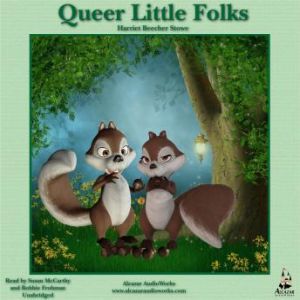

Queer Little Folks
Author: Harriet Beecher Stowe
Narrator: Bobbie Frohman, Susan McCarthy
Unabridged: 2 hr 17 min
Format: Digital Audiobook Download
Publisher: Alcazar AudioWorks
Published: 02/20/2014


Author: Harriet Beecher Stowe
Narrator: Bobbie Frohman, Susan McCarthy
Unabridged: 2 hr 17 min
Format: Digital Audiobook Download
Publisher: Alcazar AudioWorks
Published: 02/20/2014
Harriet Beecher Stowe (1811–1896) was born in Litchfield, Connecticut, the daughter of an outspoken religious leader, who raised her on devotional tales of Christian charity and brotherhood. When her father moved the family to Cincinnati, she had her first exposure to slavery and abolitionism, witnessing race riots, hearing the stories of runaway slaves, and aiding fugitive slaves from the South.
Bobbie Frohman, a third generation Californian, was raised in a large extended family, the niece of cowboys. Early on she developed a deep love of animals, training her dogs to perform with her at dog shows, and as a competitive barrel racer with her beloved horse, Lucky.
Susan McCarthy is the narrator of numerous audiobooks, including such classics as Jane Austen’s Lady Susan and Sherwood Andersen’s Winesburg, Ohio. Her love for reading began as a young girl, when she discovered the Nancy Drew mystery series and was immediately hooked. Also a voice-over artist, she received her training at VoiceTrax San Francisco.